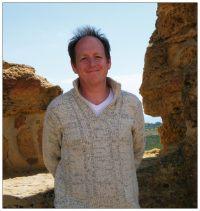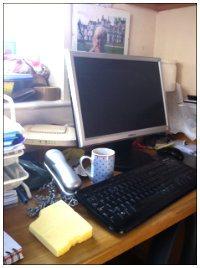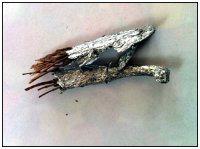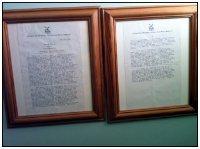 I’m delighted to welcome author Ben Hatch to Catching the Comet’s Tail. Ben is a master of the kind of acute observation of family life that has you pondering the deeper significance of the type of breakfast cereal your spouse prefers. His last book, Are We Nearly There Yet? about a family trip around Britain in a Vauxhall Astra, was wonderfully funny and incredibly poignant. The sequel, The Road to Rouen, takes us on another Hatch family trip, this time around France. Along the way, Ben’s marriage, life and love of fromage are put in equal jeopardy. I think of him as a kind John Cleese/Gerald Durrell hybrid, only featuring cars and condiments instead of animals. If you haven’t put him on your summer reading list, do!
I’m delighted to welcome author Ben Hatch to Catching the Comet’s Tail. Ben is a master of the kind of acute observation of family life that has you pondering the deeper significance of the type of breakfast cereal your spouse prefers. His last book, Are We Nearly There Yet? about a family trip around Britain in a Vauxhall Astra, was wonderfully funny and incredibly poignant. The sequel, The Road to Rouen, takes us on another Hatch family trip, this time around France. Along the way, Ben’s marriage, life and love of fromage are put in equal jeopardy. I think of him as a kind John Cleese/Gerald Durrell hybrid, only featuring cars and condiments instead of animals. If you haven’t put him on your summer reading list, do!

“My creative process simply involves sitting cross-legged on the cheese-stained swivel chair in my study for long enough to write something that’s not so dreadful the next day when I come to read it back I have the will power to try and build on it. As unromantic as it sounds, it’s a bit like bashing the end of a near empty bottle of ketchup, the ketchup bottle being my head, the ketchup itself is the words and the plate’s the screen. Hopefully (and I might be stretching this ketchup analogy way too far now) amongst the unusable, thin, red spray of relish they’ll be one salvageable dollop worth dipping a chip in.”
Was creativity encouraged in you as a child and who were your early literary influences?
“The only way I can talk about creativity in my childhood is through an analogy using Coleman’s Mustard. That’s a lie. I was pretending after the ketchup thing to be obsessed with different relishes. I’m not obsessed by different relishes. My father was in the Cambridge Footlights and a contemporary of The Goodies and half of what would become the Monty Python team but creativity wasn’t actively encouraged in our house. The ability to play sport was however, although unfortunately I was so ungainly I couldn’t work the swing in our back garden until I was about 9 and I am still unable to do a forward roll. My grandmother on my dad’s side and my mum’s sister were both excellent painters as is my sister. I desperately wanted to take after them and I remember the day I showed my dad a picture of the life-cycle of the butterfly I’d completed in 2b pencil. I’d drawn a chrysalis, a caterpillar and a cabbage white butterfly in such extraordinary detail it was attached to the fridge by my mom. Just as it was starting to be acknowledged I’d inherited my family’s artistic streak I was caught tracing a hippopotamus through greaseproof paper and exposed as a fraud. My only creative trigger has been the need to impress my father. I remember the first time I made him laugh. We were on a family holiday eating out. The joke I made was about how my sister had eaten such a lot of crab she’d probably walk out of the restaurant sideways. It’s not that funny but I was 12 and my dad was Head of Light Entertainment at BBC Radio and he seemed thrilled by the idea of “Benjy’s first joke”. From then on all I ever wanted to do was make my dad laugh. I wrote derivative Monty Python comedy sketches for a while then I tried to become an comic actor but I was hopelessly wooden. I fixed on writing books after I fell in love with Catcher in the Rye. Before I’d read this I had no idea books were capable of being funny and moving at the same time. Minus a brief period when I wanted to be a professional snooker player and became obsessed with Tony Meo that I don’t want to go into, that’s all I ever wanted to be.”
How long did it take to write The Road to Rouen and can you recall the first spark of inspiration?
“The Road to Rouen took about five months to write. The inspiration came from the tight deadline. To finish the book I had to get up at 4am every day including weekends for several months. The book is not at all as I imagined it would be. While it’s mainly light-hearted in tone I somehow ended up dissecting my marriage too which I put in jeopardy on the trip by doing some very silly things one of which included almost being gored and another saw me almost get murdered. I know rewriting a book is finished when I start taking sections out and then reinstating them before removing the day after. At that point you’re fiddling and it’s time to let it go.”
Who, what or where always inspires your creativity, no matter what and what, if anything, is guaranteed to kill it?
“I’m not aware of ever feeling inspired although some days it’s easier to write well than others. But that can often be misleading. Often when I think I’ve written something particularly good, I read it back and realize it’s rubbish but then it works the other way too. That’s why I never throw anything away. My computer is filled with abandoned chapters and scenes that one day I’m hoping to revisit and find some merit in. Seeing and experiencing new things obviously helps the creative process, especially if it’s a situation I feel uncomfortable in. In fact there’s a constant and very annoying tension in my life between avoiding things I don’t want to do because they scare me and the realisation that if I do them it’ll make good material. In an ideal world I’d get inspiration from being sat on the sofa watching telly with a bag of mixed nuts and raisons and a glass of wine by my side but that’s not the way it works unfortunately.”
Do you ever feel that creating new things is a chore and what do you do when you feel blocked creatively?
“I’d much rather be rewriting than writing something new. It’s not a chore in the same way working on an Icelandic trawler at 3am reeling in a herring net is a chore, but it’s the hardest part of the job. That’s because you know 90 per cent of what you’re writing won’t survive in the final draft. There can’t be many jobs that are this unproductive. If you worked in any other profession, say as a doctor or teacher, and wasted 90 per cent of your time you’d be fired. In terms of writer’s block, I don’t believe in it. I know this because I once spent seven years writing the same book. That happened because I decided I wanted the novel out of contract. A terrible mistake. A writer with writer’s block is a writer in need of a deadline.”
Please talk a bit about the environment you like to be in to write.

“As long as I have a qwerty keyboard I don’t mind where I work although I like to be near a kettle, a toaster and a sizeable lump of cheese to gnaw on like a rat. I like to play music in the background and I often loop a particular song. I can play the same track 456 times over without getting in the slightest bit bored of it. However, I work alongside my wife (about 20cm from her in fact. She’s a freelance travel journalist and we share a study) and this tends to drive her crazy so on the whole I work in silence apart from every now and again like just now when she leant over and showed me a picture of a Victorian tap online that she thought we should have in the bathroom because there was a picture of a similar one in the Sunday Times style section at the weekend.”
Do you have a daily routine when you are writing?
“I like to start early before my kids wake up, before anyone is on twitter or emailing and also so I can act like a weary martyr in the evening when my wife asks me to do something trivial such get up and put the latest Friday Night Lights disc in the DVD player. “Can you? (pained face) I did get up at 5am.” I don’t have a set word count like most authors. Instead I give myself a time limit to complete a chapter.”
Is there a collaborative element to your work?
“I’ve always wanted to work collaboratively. It’s the way they put together American sitcoms and often I’ve pictured myself firing off ideas sat around a table with other writers but in reality the chances are I’d probably not contribute anything under this system because I’d be too shy or diffident and instead I’d merely laugh at everyone else’s stuff feeling disgruntled and intimidated. I don’t like to show anyone anything until right at the end. In the past I’ve shown my wife something too early and it’s always counter productive because if she dislikes it, it’s disheartening and if she likes it, it’s always the bit that you later feel has to be cut but now as she liked it, you’re resistant to this idea, and the whole process slows down.”
Please share a photo of an object that connects with your creative process.


Which other creative art form outside the one you are known for do you wish you could master?
“I’d love to be the sort of person who could sit on a pretty hill in a loose fitting shirt with unbuttoned cuffs and paint a typical English landscape below me in oils maybe in a soft flat hat with a picnic hamper of sandwiches for lunch in a small knapsack between my feet. That would be immensely relaxing, I imagine. I’d also like to be able to play the piano. I took lessons when my daughter started aged 6 but within weeks she was better than me and I lost heart and quit when she criticised my scales.”
How did becoming a parent affect your creativity?
“What’s the Cyril Connolly quote: “There is no more sombre enemy of good art than the pram in the hall.” I believed that for many years and it almost stopped me having kids. Then when I had them I discovered it was bollocks. If anything becoming a father helped instil some discipline into my life and writing. Like how football manager’s always want their players to get married and settle down because they focus more on their game, it was the same with me. Every hour spent working has a premium when you have young kids because it’s time you could be spending with them watching Underground Ernie or making a den out of sofa cushions and travel rugs. It means you have to make your hours at the keyboard count and try your best to get off Twitter and websites where there are admittedly quite humorous objects that look like Hitler.”
Please say as much or as little as you’d like about your next book and the stage you are at with it.
“The Road to Rouen, the sequel to Are We Nearly There Yet? has just been published by Headline. It’s about a 10,000 mile drive around France that I completed with my family. I was researching a guidebook. I thought the greatest danger would be the boredom of spending so long in the car although at various points we’re attacked by a donkey, there’s a run-in with a death-cult, a calamitous wedding experience involving a British spy before I almost end up starring in a snuff movie after a near fatal decision to climb into a millionaire’s Chevrolet Blazer. Although actually the book is really about marriage and the up and downs that everyone experiences along this journey. I’m also currently working on a sitcom treatment of my first novel The Lawnmower Celebrity for the BBC as well as researching my next travelogue which will be a road-trip round Italy. I also have a theory about curing the common cold. Seriously. I’m on to something. It involves sneezing, that’s all I’ll say. Watch this space.”

Road to Rouen is published on May 23rd by Headline books. You can order it here.
